剑桥国际英语教程(入门级)4单元(全)
剑桥少儿英语 Unit 4 We are having an English class
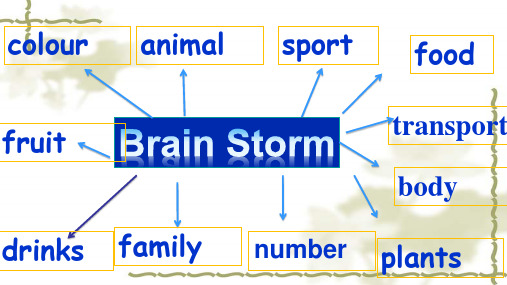
③Listen, read and act.
(4)Colour the words.
❖ Look at the colours of the pictures. ❖ 看着图片中的颜色。 ❖ Colour each letter of the words the same colour as the picture. ❖ 然后把相应单词涂上相同的颜色。
taking pictures
playing basketball
A:What's she/he doing? B: She's/He's ________.
playing football
reading a book
running
watching TV
What are they doing? They are doing taijiquan.
❖ What’s the English for“Qianbihe”? ❖ “铅笔盒”的英语怎么说? ❖ Pencil-case.
❖ I’m sorry. (做错事向别人道歉)对不起。 ❖ That’s OK. 没关系。
(6)Listen and say.
❖ 一只肥猫抓住一只疯老鼠。 ❖ 她在小屋里卖羊。
Be 动词填空
• I _a_m_ dancing . • He __is_ flying a kite . • She _i_s_ jumping . • We _a_r_e learning English . • They _a_re_ drawing pictures . • Jane and Mary _a_re_ talking . • My father __is_ watching TV . • My friends _a_re_ swimming . • You and your mother _a_re_ playing in the garden . • _A_r_e you a student ?
剑桥国际英语教程(入门级)4单元(全) PPT

重点单词
• favorite adj. 最喜爱的;n.喜欢的事物 • What are your favorite sports/colors? • 你喜爱的运动/颜色是什么? • Who is your favorite TV star/singer? ? • 谁是你最喜爱的电视明星/歌手? • Fruit and vegetables are my favorite. • 蔬菜水果是我最喜爱的食物。
Unit4
I’m not wearing boots
1.学会关于服装、季节、天气的单词 2.学会现在进行时的形式、变换、造句 3.表演一个对话。
1
蚊子舞
2
Clothes for work
• shirt
• 衬衣
• tie
• 领带
• belt
• 腰带
• coat
• 上衣
• shoes
• 鞋子(pl)
• hat • sweater • gloves • jeans • boots • cap • t-shirt • shorts
• 帽子
• 毛衣
• 手套
• 牛仔(pl)
• 靴子(pl)
• 帽子
• T恤
• 短裤
5
Clothes for leisure
• socks • sneakers • pajamas • swimsuits • underwear
7
colors
• blue
• 蓝色
• purple
• 紫色
• gray
• 灰色
• white
• 白色
• brown
• 棕色
• black
• 黑色
4 剑桥国际英语 入门级 第4单元
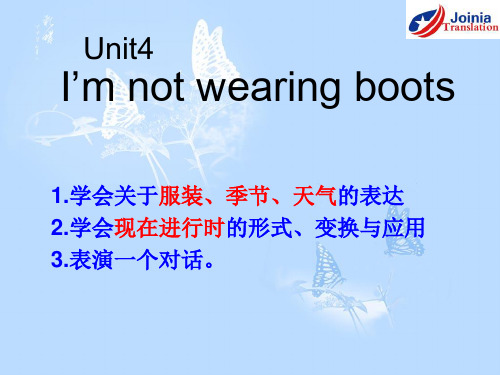
7. Seasons and weather
7. Seasons and weather
1 . What are the seasons in your country? 2. What is your favourite season? 3. what is the weather like today? 7.1 温度的单位及表达:
I’m not wearing boots
1.学会关于服装、季节、天气的表达 2.学会现在进行时的形式、变换与应用 3.表演一个对话。
Unit4
练一练
• • • • • • • sh__t b_lt c__t sh___ j___et p___s s__t • • • • • • • 衬衣 腰带 上衣 鞋子(pl) 夹克 裤子 套装
原文
P: Great! Our clothes are dry. Where is my new blouse? J: What color is it? P: it’s white. J: Here’s a light blue blouse. Is it yours? P: No, it’s not mine---Wait. It is mine. It’s a disaster! J: Oh, no. All our clothes are light blue. P: Here’s the problem. It’s these new blue jeans. Whose jeans are they? J: Uh, they’re mine. Sorry.
表演一个对话
• • • • • • • • 太好了,我们的衣服干了。我的新上衣在哪? 它是什么颜色? 白色。 这有一件浅蓝色的上衣。是你的吗? 不,不是我的。。。。等等,是 我的,全完了! 哦,不!我们的衣服全都 成浅蓝色的了。 问题出在这,是这条蓝色的牛仔裤。这是谁的? 呃,它是我的。不好意思。
interchange剑桥国际英语教程入门级 Unit4-Unit5综合试题和练习集锦
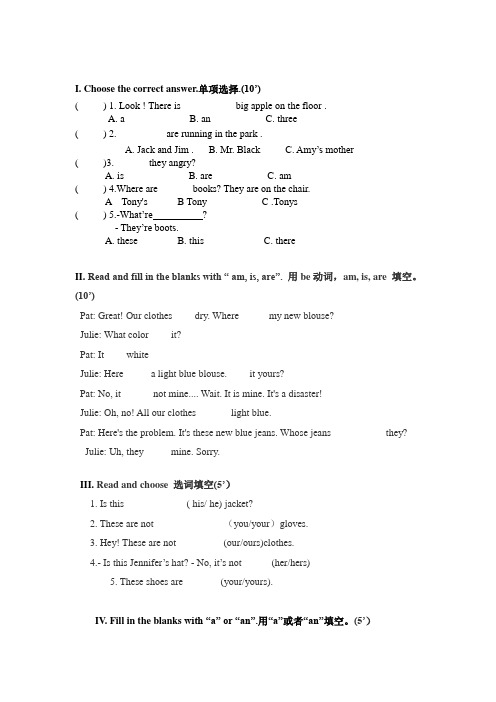
I. Choose the correct answer.单项选择.(10’)( ) 1. Look ! There is __________ big apple on the floor .A. aB. anC. three( ) 2. _________ are running in the park .A. Jack and Jim .B. Mr. BlackC. Amy’s mother( )3. ______ they angry?A. isB. areC. am( ) 4.Where are ______ books? They are on the chair.A Tony'sB TonyC .Tonys( ) 5.-What’re?- They’re boots.A. theseB. thisC. thereII. Read and fill in the blanks with “ am, is, are”. 用be动词,am, is, are 填空。
(10’)Pat: Great! Our clothes ____dry. Where _____ my new blouse?Julie: What color____ it?Pat: It____ whiteJulie: Here _____a light blue blouse. ____it yours?Pat: No, it ______not mine.... Wait. It is mine. It's a disaster!Julie: Oh, no! All our clothes ______ light blue.Pat: Here's the problem. It's these new blue jeans. Whose jeans _________they? Julie: Uh, they_____ mine. Sorry.III. Read and choose 选词填空(5’)1. Is this ____________( his/ he) jacket?2. These are not ____________(you/your)gloves.3. Hey! These are not _________(our/ours)clothes.4.- Is this Jennifer’s hat? - No, it’s not______(her/hers)5. These shoes are _______(your/yours).IV.Fill in the blanks with “a” or “an”.用“a”或者“an”填空。
剑桥国际英语教程4教案

剑桥国际英语教程4教案剑桥国际英语教程4Unit 1Friends and familyContentsA. What kind of person are you?B. Every family’s different.Functions◆Describing personalities◆Expressing likes and dislikes◆Describing personal change◆Stating advantages and disadvantages◆Talking about rulesGrammar◆Gerunds◆Noun clauses after BEVocabulary◆Adjectives describing personality traitsDiscussion◆Finding out what personality traits you have in common with your classmates ◆Studying personality profiles◆Talking about how you have changed or how you would like to change◆Comparing families◆Talking about rules in your familyListening◆Three young people describe how they have changed◆Two people compare similari ties and differences between their families Writing◆Identifying the main idea in a paragraph◆Writing a paragraph about your most positive or negative qualityReading◆“upside-down families”: families where the children have too much controlUnit 2Educations and learningContentsA How can schools be improved?B What’s the best way to learn?Functions◆Stating facts◆Making recommendations◆Describing processes and strategies◆Giving reasons and purposes◆Talking about hopes and dreamsGrammar◆Should and ought to in the active and passive \◆Infinitives and gerunds to talk about how to do things◆In order to and so thatVocabulary◆Collocations relating to goalsDiscussion◆Making suggestions to improve schools◆Explaining how school prepares young people for life◆Stating your goals for the future◆Discussing different ways to learn somethingListening◆Two young people explain how they developed personallyat college◆Three people describe the strategies they used to learn something newWriting◆Choosing topic sentences◆Writing a paragraph about your educational beliefsReading◆“Home Schooling: A growing trend”: advantages and drawbacks of educatingchildren at homeUnit 3CitiesContentsA. Fascinating destinationsB. It’s my kind of cityFunctions◆De scribing and giving information about places◆Stating preferences◆Presenting contrasting information◆Categorizing and evaluating issuesGrammar◆Defining and non-defining relative clauses◆Order of adjectives◆Connecting contrasting ideasVocabulary◆Nouns referring to features of a city◆Nouns relating to quality-of-life issuesDiscussion◆Explaining why you would like to visit a particular city◆Choosing the right city for a particular purpose◆Deciding which city is best to live in◆Evaluating your hometown◆Discussing quality-to-life issuesListening◆ A TV show introduces two exciting cities◆Two foreign students explain what they like about their host city◆Two New Yorkers talk about life in their cityWriting◆Creating topic sentences◆Writing a paragraph about a place you knowReading“Get Yourself Lost”: The best way to enjoy sight-seeing in a new placeUnit 3Day and nightContentsA. Your energy profileB. Sweet dreamsFunctions◆Describing daily routines and habits◆Giving advice◆Explaining reasons and conditions◆Giving interpretations of meaningGrammar◆Time relationships◆Clauses stating reasons and conditionsVocabulary◆Collocations referring to sleep and dreamsDiscussion◆Discussing personal energy levels◆Classifying activities that raise or lower your energy level◆Giving advice on a radio call-in program◆Talking about sleeping habits◆Interrupting dreamsListening◆Three people describe methods they use to lower stress◆Two people describe their dreams and try to figure out what they mean Writing◆Choosing the best topic sentence◆Writing a paragraph about times of day, daily schedules, or relaxation. Reading“Ten Keys to a Better Night’s Sleep”: Tips on fulfilling a basic human needUnit 5Generally speakingContentsA. What is typical?B. Topics of concernFunctions◆Comparing customs and habits◆Presenting contrasting information◆Making generalizations◆Discussing concerns and offering solutions◆Describing a mental processGrammar◆Showing contrast and exception◆Quantifiers◆Conditional sentencesVocabulary◆Adjectives describing emotional reactions◆Nouns referring to public concernsDiscussion◆Talking about what’s advantage◆Discussing what makes you typical or unique◆Talking about future concerns◆Explaining your persona l concernsListening◆Three teenagers compare themselves to other people their own age◆Three people describe their different approaches to solving problemsWriting◆Identifying supporting statements◆Developing a paragraph with supporting statementsReading“Statistically Speaking”: the living arrangements, education level, and beliefs of the average American Unit 6Interpersonal communicationContentsA. Making conversationB. Personal secretsFunctions◆Describing types◆Talking about appropriate behavior◆Starting a conversation◆Making small talk◆Reporting what someone else has saidGrammar◆Infinitive and gerund phrases◆Reported speechVocabulary◆Adjectives describing positive and negative feelings Discussion◆Describing conversational styles and habits◆Giving advice for awkward social situations◆Determining appropriate topics for small talk◆Deciding if it is appropriate to tell secrets◆Reporting new about your classmatesListening◆Several people make small at a party◆Three people tell s ome interesting newsWriting◆Keeping a journal◆Writing your reaction to a good piece of news Reading“Don’t Be a Bore!”: How to be a good conversationalist.Unit 7Telling the newsContentsA. StorytellingB. What’s in the news?Functions◆Presenting information in chronological order◆Narrating news events◆Organizing and presenting topical information Grammar◆Adverbs with the past and past perfect◆Present perfect vs. past◆Past vs. past continuousVocabularyNouns referring to events in the newsDiscussion◆Telling stories about uncomfortable situations◆Talking about personal experiences◆Creating a story with your classmates◆Studying the different sections of a newspaper◆Presenting a news story of local interestListening◆Two people describe pe rsonal dilemmas◆An actress describes her most embarrassing moments◆ A radio broadcast highlights the top new stories of the day Writing◆Putting events in order◆Writing a narrative paragraphReading“Nutty’s News”: Humorous news articles about some strange eventsUnit 8ValuesContentsA. Growing upB. The wisdom of ageFunctions◆Expressing regrets about the past◆Referring to fortunate events in the past◆Evaluating traits of character◆Describing people’s attitudes and beliefsGrammar◆Should have and ought to have; wished about the past◆Adjectives of emotion+ past time clauses◆Noun clauses introduced by it◆Noun clauses introduced by verbsVocabulary◆Nouns referring to values and traits of character◆Adjectives describing personal attitudes◆Colloc ations relating to positive actionsDiscussion◆Talking about values you have learned◆Describing personal memories and regrets◆Giving advice to young people on getting the most out of life◆Stating personal beliefsListening◆An interviewer asks people a bout personal values◆Three people describe their role modelsWriting◆Choosing a thesis statement for a multi-paragraph composition◆Writing a composition about a significant time in your past Reading“It’s not so bad to be middle-aged”: some of the rewards of middle ageUnit 9Putting the mind to workContentsA. Exploring creativityB. Ideas that workFunctions◆Describing job qualifications◆Offering solutions to problems◆Commenting on facts◆Analyzing reasonsGrammar◆Reduced relative clauses◆No n-defining relative clauses as sentence modifiersVocabulary◆Nouns referring to creative qualities◆Collocations related to problem solving◆Nouns referring to inventionsDiscussion◆Describing jobs that require creativity◆Taking a creativity quiz◆Findi ng creative solutions to difficult problems◆Choosing inventions that have had a great impact on twentieth-century life◆Explaining why new products are inventedListening◆Three employees explain how their jobs are creative◆Three people devise imaginary inventionsWriting◆Choosing new paragraph beginnings◆Writing a composition about someone who is creative or uniqueReading“Silly Questions, Brilliant Answers”: the strange history of three influential productsUnit 10The art of complainingContentsA. That really bugs me!B. Let’s do something about it!Functions◆Describing everyday irritations◆Describing personal styles of complaining◆Making complaints◆Responding to complaints◆Identifying problems and offering solutions◆Giving adviceGrammar◆Nou n clauses containing relative clauses◆Noun clauses beginning with question with question words, whether, and if. VocabularyNouns relating to consumers and purchasesDiscussion◆Complaining about everyday annoyances◆Comparing styles of complaining◆Finding solutions to problems in your community◆Stating consumer complaints◆Giving advice on avoiding consumer problemsListening◆Two people describe irritating situations◆Two friends compare the problems in their neighborhoodsWritingWriting a letter of complaintReading“Getting What You are Entitled To”: How to exercise your rights as a consumerUnit 11On the other side of the worldContentsA. Culture shockB. Globe-trottingFunctions◆Comparing and contrasting customs◆Predicting the future◆Mak ing hypotheses◆Giving advice◆Explaining preferencesGrammar◆Future perfect and future perfect continuous◆Gerunds as the objects of prepositions◆Mixed conditionsVocabularyCompound adjectives relating to personal characteristicsDiscussion◆Giving advice on moving overseas◆Comparing customs between North America and your country◆Imagine the experience of living abroad◆Telling how a trip you took could have been better◆Explaining your travel preferencesListening◆Three young people talk about th e positive and negative aspects of living abroad ◆Three travelers describe personal mishapsWritingPlanning a compositionReading“Smooth Talking”: Overcoming the language barrier when traveling abroadUnit 12DilemmasContentsA. Public concernsB. How honest are you?Functions◆Stating and supporting opinions◆Describing personal characteristics◆Discussing hypothetical situations◆Explaining decisionsGrammar◆Adding information and showing conclusions◆The passive of the present continuous◆Conditions with if, only if, unless, and even if.VocabularyAdjectives and nouns describing people and how they view the worldDiscussion◆Describing controversial issues◆Giving opinions about current issues◆Giving reasons for behavior◆Explaining how you would solve personal dilemmasListening◆Three people explain what issues they think are important◆Two people describe being confronted by an ethical dilemmaWritingWriting a paragraph about a public concernReading“Little Lies” : Common lies we tell in every day life。
剑桥国际英语教程第四册 听力部分答案
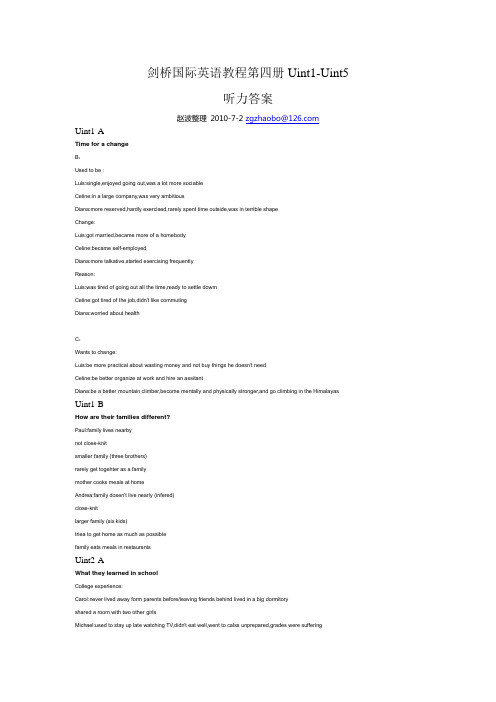
剑桥国际英语教程第四册Uint1-Uint5听力答案赵波整理2010-7-2 ****************Uint1-ATime for a changeB:Used to be :Luis:single,enjoyed going out,was a lot more sociableCeline:in a large company,was very ambitiousDiana:more reserved,hardly exercised,rarely spent time outside,was in terrible shapeChange:Luis:got married,became more of a homebodyCeline:became self-employedDiana:more talkative,started exercising frequentlyReason:Luis:was tired of going out all the time,ready to settle dowmCeline:got tired of the job,didn't like commutingDiana:worried about healthC:Wants to change:Luis:be more practical about wasting money and not buy things he doesn't needCeline:be better organize at work and hire an assitantDiana:be a better mountain climber,become mentally and physically stronger,and go climbing in the Himalayas Uint1-BHow are their families different?Paul:family lives nearbynot close-knitsmaller family (three brothers)rarely get togehter as a familymother cooks meals at homeAndrea:family dosen't live nearly (infered)close-knitlarger family (six kids)triea to get home as much as possiblefamily eats meals in restaurantsUint2-AWhat they learned in schoolCollege experience:Carol:never lived away form parents before/leaving friends behind lived in a big dormitoryshared a room with two other girlsMichael:used to stay up late watching TV,didn't eat well,went to calss unprepared,grades were sufferingWhat they learned form it:Carol:how to get along with others,how to respect other people's opinions and property'how to get along living in tight quartersMichael:how to manege time better,how to be more responsibleUint2-BWhat's their learning strategy?How thay are trying to learn:Frank:study group with the friendsRegina:reading tne manualSonia:taking a class at the community centerProblems they are having:Frank:some people come unprepared,or forget their notes,or don't read the chapter beforehandRegina:too much information to remember,not enough time to study the manualSonia:class is too difficult ,other Ss are better , the teacher is not very good / wanders off the topicUint3-AWhat do you like about the city?City: Deborah:Seoul Todd:Salvador Features: Deborah:one of the ten largest metropolitan areas;cosmopolitan;unique spicy food;noodles,barbecued beef;very old;combination of old and new architecture;efficient subway system;discount shopping Todd:very old;founded by Portuguese;third largest;population of 2 million; built into a cliff;overlokks bay;on two;elevator between levels;beautiful beaches;African influence in music,food,and dance;can watch special kind of dancing;great nightlife;street festivalsUint3-BLife in New York CityQuality-of-life issue:Lindsay:subways on-schedule noise from garbage trucks nightlife:theater and restaurantsEric:cleanliness and safety cold weatherHow do they feel about them:Lindsay:pleased unhappy;they wake her up in the morning excited;wants to do everythingEric:thinks the city has improved in these areas tired of it;ready for a changeUint4-AManaging stressFrequent cause of stress:Lsa:job is hard;has to be organized,disciplined,and self-motivatedSean:traffic,rude driversVictor:demanding doctors,pressured peopleMethod of lowering stress:Lisa:takes a hot bath,watches TV,drinks teaSean;listens to music in car,watches funny movie,goes to friend's houseVictor:goes to gym, goes for a drive in the countryUint4-BI had the widest dream.Dreams:Lucia:back in high school;lost her clas schedule;can't find the main office;late for class;doesn't know what homework she must do;missed an important testRick:in danger but unable to move or scream;in his own bed and senses something coming closer;needs to alert someone,but can't move Meaning:Lucia:she's worried or overwhelmed about something in her lifeRick:not in control of something(once had a dream when one of his children was sick)1.She's 20 and has been sent back to high school with the younger students.2.She has lost her class schedule.3.So she can find out where she is supposed to be .4.Someone or something is coming closer to him with the intention of harming him.5.In his bedroom.6.Warn or save someone.7.One of his children was very sick.Uint5-AHow are they different?Similar:Yashiko:goes to a public high school,wears a uniform,goes to school five and a half days a week,similar interests to friends,plays video games,fan of American movies,likes Brad PittRenato:goes to school from seven until midday,after school studies or plays soccer,on weekends hangs out with friends in shopping centers. Suzanne:worries about grades and getting along with parents goes to classes,attends club meeting,does homework,sleeps late on weekends. Different:Yoshiko:lived outside Japan for six years,learned to speak English while living overseas.Renato:does his own thing ,doesn't always hang out with group,thinks for himselfSuzanne:goes to special school for arts where she studies core subject and music,dance,and artUint5-Bhe different approaches to problem solvingConcerns:Dominique:making expensive purchases;making a mistake and getting stuck with itCarla:hiring the right personWayne:where to spend Christmas holidaysType of problem solver:Dominique :meditative(reads consumer magazines for car ratings,speaks to knowlegeable people in the field,then test-drives the car)Carla:assertive(doesn't like to waste time making decisions,perfers to go with her instincts and act quickly)Wayne:cooperative (talks to a lot of people to get their input,analyze the problem from different people's perspective)。
剑桥国际英语教程(入门级)知识总结
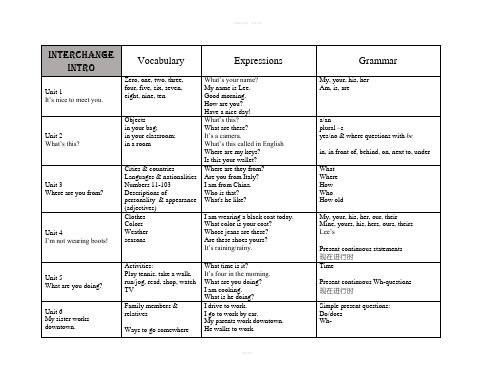
Do/does
Wh-
Unit 7
Does it have a view?
Rooms in a house/an apartment
Furniture
I live in an apartment/a house.
Does Less live in a house?
Lee’s
Present continuous statements
现在进行时
Unit5
What are you doing?
Activities:
Play tennis, take a walk, run/jog, read, shop, watch TV
What time is it?
It’s four in the morning.
How old were you then?
What was your major in college?
How was college?
一般过去时
Statements with the past ofbe
Questions with the past ofbe
Wh-questions with did, was, and were
How do you like it?
What do you think of it?
What time do you start your job?
When do you finish your job?
Placement of adjectives
A doctor’s job is stressful.
Does your house have a yard?
剑桥国际英语教程Unit4 Do you like rap

FTF Face to face 面对面 GF= girlfriend 女朋友 IC = I see 我明白 OIC = Oh, I see 哦,我知道 IMO = In my opinion 依我所见 IOW = In other words 换句话说 LOL = laughing out loudly 大声笑 NRN = No reply necessary 不必回信 ILU = I love you 我爱你 RSVP = Reply if you please 请答复 VG = very good 很好
WARMING-UP
Do you like music? Which singer or band do you like most? What kind of music do you like best?
7 5 8 4 2 3 6 8
game show news soap opera talk shows cartoons documentaries sport events reality shows gala dating show
克里斯蒂娜 · 阿奎莱拉( CHRISTINA AGUILERA )
克里斯蒂娜· 阿奎莱拉(Christina Aguilera), 1980年12月18日出生于美国纽约史泰登岛,美国 女歌手,身兼演员、词曲创作者、化妆品制造商、 慈善家于一身。得天独厚的才华与跨越四个八度 的嗓音,使她成为新世纪具代表性实力与偶像艺 人。 拥有4000万张专辑销量,五首全美冠军单曲,五 个格莱美奖,两项MTV视频音乐奖,一个电台音 乐奖等诸多荣誉,并入选滚石杂志史上最伟大的 100位歌手,入围《时代》周刊最具影响力名单。
Groups competition
- 1、下载文档前请自行甄别文档内容的完整性,平台不提供额外的编辑、内容补充、找答案等附加服务。
- 2、"仅部分预览"的文档,不可在线预览部分如存在完整性等问题,可反馈申请退款(可完整预览的文档不适用该条件!)。
- 3、如文档侵犯您的权益,请联系客服反馈,我们会尽快为您处理(人工客服工作时间:9:00-18:30)。
-----的
• 表示拥有权。一般在人或者其他名词后直 接加’s • 例如:Tom’s 汤姆的 Class three’s 三班的 • That’s Tom’s watch=That watch is Tom’s
对话
• great! (口语)太棒了。 • clothes are dry.我的衣服干了。 衣服一般为复数名词,所以用are. what color is it? it’s white. 它是什么颜色?白色 is it yours? 这是你的吗? No, it’s not mine.这不是我的 Here’s the problem.问题出在这。 whose jeans are they?这是谁的牛仔裤?
P: ! Our clothes dry. Where is my new blouse? J: ? P: it’s white. J: Here’s a light blue blouse. ? P: No, it’s not mine---Wait. It is mine. ! J: Oh, no. our clothes are light blue. P: . It’s these new blue jeans. Whose jeans are they? J: Uh, . Sorry.
Unit4
I’m not wearing boots
1.学会关于服装、季节、天气的单词 2.学会现在进行时的形式、变换、造句 3.表演一个对话。
蚊子舞
Clothes for work
• • • • • • • • shirt tie belt coat shoes jacket pants suit • • • • • • • • 衬衣 领带 腰带 上衣 鞋子(pl) 夹克 裤子 套装
重点单词
• • • • whose 谁的 用于提问主人。回答是”----的“。 who 谁 仅用于提问人。
物主代词
• 形容词性物主代词后 有名词 • my • your • his • her • its • our • their
• 名性物主代词后无名词, 典型标志是有”s“ • mine • yours • his • hers • its • ours • theirs
翻译
• • • • • • • • 太好了,我们的衣服干了。我的新上衣在哪? 它是什么颜色? 白色。 这有一件浅蓝色的上衣。是你的吗? 不,不是我的—等一下,是我的,全完了。 哦,不。我全部的衣服全部成浅蓝的了。 问题出在这,是这条蓝色的牛仔裤。这是谁的? 呃,它是我的。不好意思。
P: Great! Our clothes are dry. Where is my new blouse? J: What color is it? P: it’s white. J: Here’s a light blue blouse. Is it yours? P: No, it’s not mine---Wait. It is mine. It’s a disaster! J: Oh, no. All our clothes are light blue. P: Here’s the problem. It’s these new blue jeans. Whose jeans are they? J: Uh, they’re mine. Sorry.
重点单词
• ask vt. 问,询问;要求 ;邀请
• I asked her but she didn‘t answer. 我问她但她不回答。 • It‘s asking for trouble. 这是自找苦吃。 • We asked him to dinner. 我们请他吃饭。
重点单词
• • • • • • • favorite adj. 最喜爱的;n.喜欢的事物 What are your favorite sports/colors? 你喜爱的运动/颜色是什么? Who is your favorite TV star/singer? ? 谁是你最喜爱的电视明星/歌手? Fruit and vegetables are my favorite. 蔬菜水果是我最喜爱的食物。
Clothes for leisure
• • • • • socks sneakers pajamas swimsuits underwear • • • • • • 袜子 运动鞋 睡衣 泳装 内衣,内裤 发夹
• barrette [bə'ret]
பைடு நூலகம்
colors
• • • • • • • red pink orange yellow light green green dark green • • • • • • • 红色 粉色 橘色;橙色 黄色 浅绿 绿色 深绿
Clothes for work
• • • • • • blouse scarf skirt high heels dress raincoat • • • • • • 上衣 围巾 裙子 高跟鞋 连衣裙;礼服 雨衣
Clothes for leisure
• • • • • • • • hat sweater gloves jeans boots cap t-shirt shorts • • • • • • • • 帽子 毛衣 手套 牛仔(pl) 靴子(pl) 帽子 T恤 短裤
colors
• • • • • • • • blue purple gray white brown black light brown dark brown • • • • • • • • 蓝色 紫色 灰色 白色 棕色 黑色 浅棕色 深棕色
其他
• • • • • • dry wet yours mine hers whose • • • • • • 干的 湿的 你的 我的 她的 谁的
